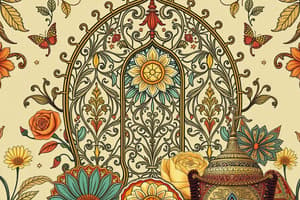Podcast
Questions and Answers
Consumer borrowing: The act of borrowing money by individuals for personal use. Opportunity Cost: The value of the next best alternative that is given up when a choice is made. Cash: A physical medium of exchange that is generally accepted as payment for goods and services. Check: A written order to a bank to pay a specified sum of money from the drawer's account to the payee. Consumer credit: The use of borrowed money to purchase goods and services. Consumption: The act of using goods and services to satisfy one's needs and wants. Drawee: The bank that has been instructed to pay a check. Drawer: The person who writes a check. Taxes: Compulsory payments levied by the government on income, property, and other items. Law of Scarcity: The principle that economic resources are limited and therefore must be allocated carefully. Value Added Tax (VAT): A consumption tax that is imposed on the value added to goods and services at each stage of production and distribution. Bank statement: A ______.
Consumer borrowing: The act of borrowing money by individuals for personal use. Opportunity Cost: The value of the next best alternative that is given up when a choice is made. Cash: A physical medium of exchange that is generally accepted as payment for goods and services. Check: A written order to a bank to pay a specified sum of money from the drawer's account to the payee. Consumer credit: The use of borrowed money to purchase goods and services. Consumption: The act of using goods and services to satisfy one's needs and wants. Drawee: The bank that has been instructed to pay a check. Drawer: The person who writes a check. Taxes: Compulsory payments levied by the government on income, property, and other items. Law of Scarcity: The principle that economic resources are limited and therefore must be allocated carefully. Value Added Tax (VAT): A consumption tax that is imposed on the value added to goods and services at each stage of production and distribution. Bank statement: A ______.
document
Flashcards are hidden until you start studying




